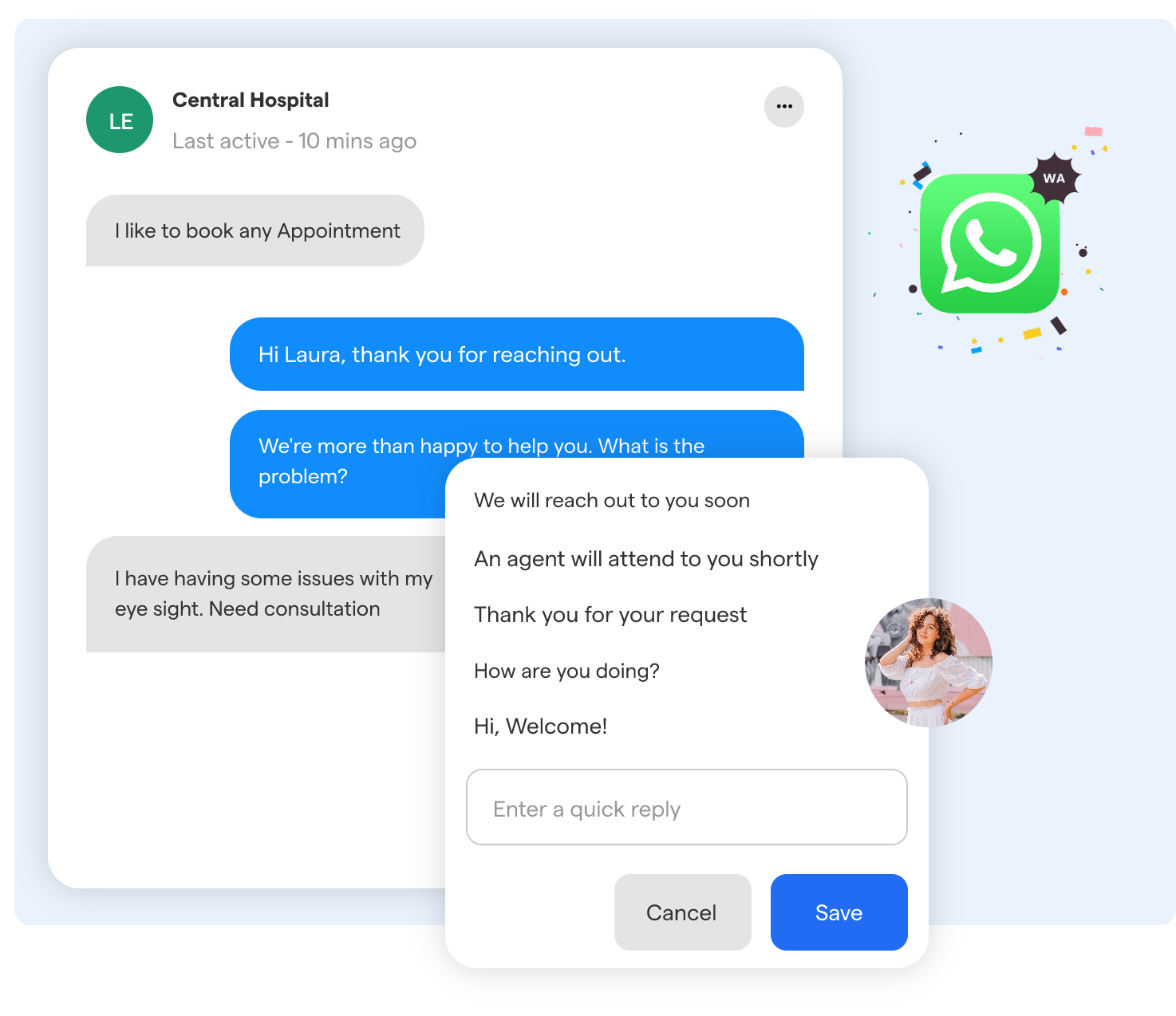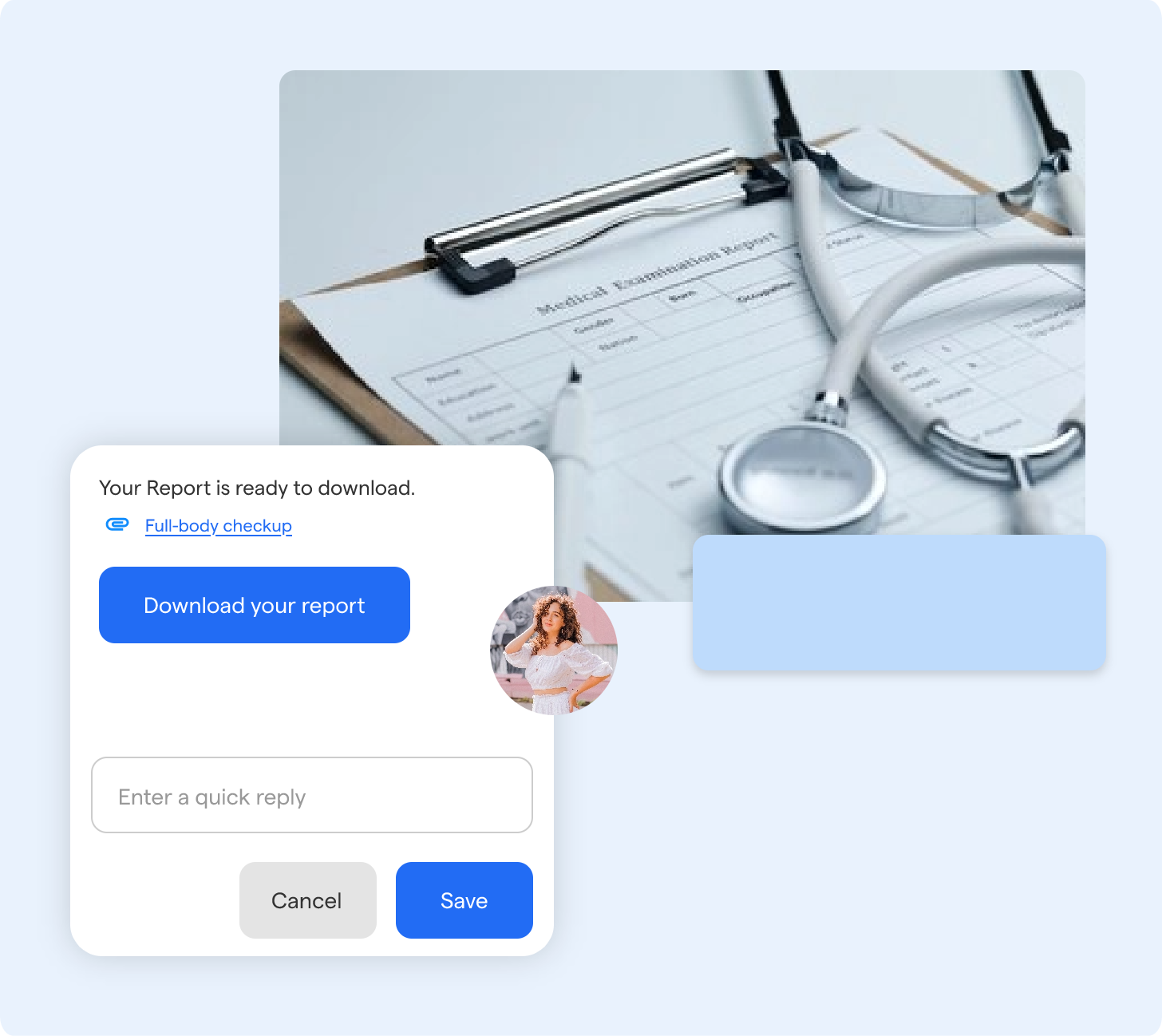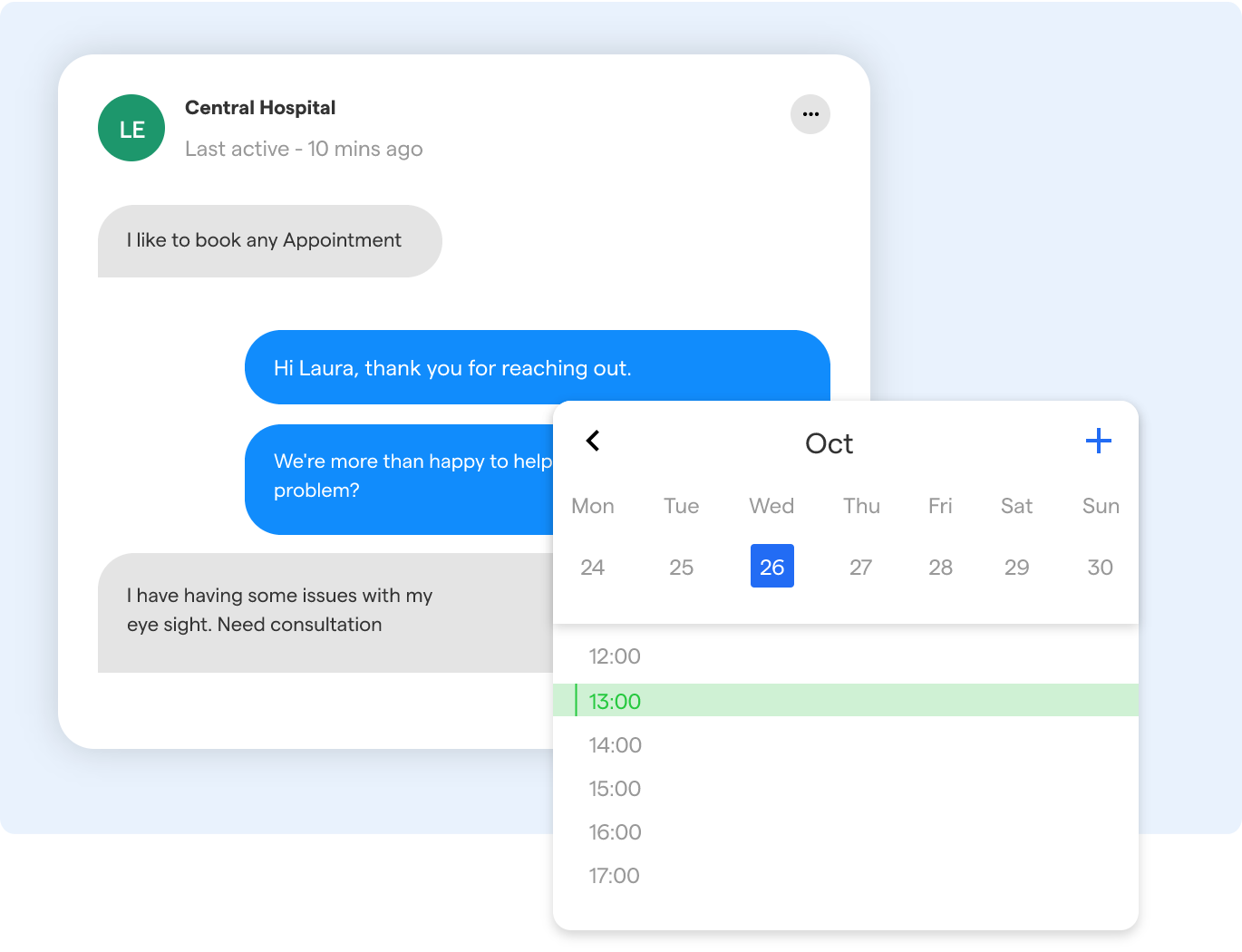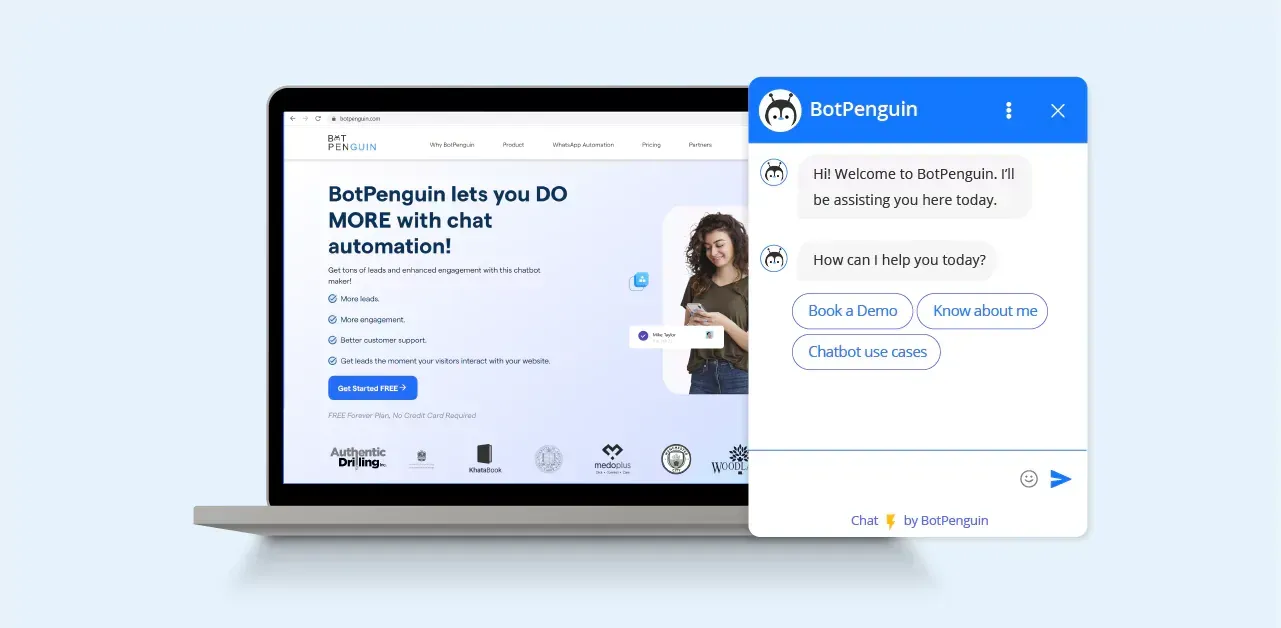Healthcare organizations can greatly benefit from implementing WhatsApp chatbots to improve patient care and efficiency. WhatsApp currently has over 2 billion active users worldwide, presenting an immense opportunity for healthcare providers to reach people with important health information and services.
Studies by Accenture have found that 70% of people are willing to use chatbots to receive healthcare information. Chatbots can also significantly reduce the time needed for tasks like booking appointments, from over 11 minutes on average down to under 3 minutes in some cases.
By integrating an AI-powered chatbot on WhatsApp, healthcare providers can offer faster appointment bookings, automated patient screening, 24/7 access to health advice, and ongoing care support. Patients appreciate the convenience of interacting with a responsive chatbot for their health and care questions.
For healthcare organizations, chatbots lead to reduced administrative costs, better allocation of staff resources, and enhanced patient satisfaction. In the wake of the COVID-19 pandemic, chatbots on platforms like WhatsApp present an immense opportunity to keep patients informed while improving the efficiency of strained healthcare systems.
So continue reading to know more about it.
What is a WhatsApp Chatbot for Healthcare?

A WhatsApp chatbot for healthcare is an automated conversational system designed to provide healthcare support and assistance to users through WhatsApp messaging platform. These chatbots are programmed with advanced algorithms and natural language processing capabilities, enabling them to understand and respond to user queries in a human-like manner.
How Does a WhatsApp Chatbot Work for Healthcare?
WhatsApp chatbots for healthcare leverage the functionalities provided by the WhatsApp Business API. They are integrated into the platform, allowing users to interact with the chatbot through WhatsApp's familiar messaging interface. The chatbot receives user queries, analyzes them using natural language processing, and generates appropriate responses based on predefined rules, medical knowledge, or algorithms.
Benefits of Using WhatsApp as the Platform for Healthcare Chatbots
Using WhatsApp as the platform for healthcare chatbots offers several benefits for both healthcare providers and patients.
Increasing Accessibility to Healthcare Information
WhatsApp is one of the most widely used messaging platforms globally, with billions of active users. By building chatbots on WhatsApp, healthcare providers can reach a large audience and extend their services to individuals who prefer text-based communication. This increases accessibility to healthcare information, especially in areas with limited internet connectivity or where traditional healthcare services are not easily accessible.

Real-time and Instant Support
WhatsApp chatbots offer 24/7 availability, providing real-time and instant support to users. Patients can ask questions, seek medical advice, or access healthcare information at any time of the day, eliminating the need to wait for clinic openings or healthcare professionals' availability. This real-time support is particularly valuable in emergency situations or for individuals seeking immediate healthcare guidance.
Personalized Interactions and Tailored Recommendations
WhatsApp chatbots, like BotPenguin, can offer personalized interactions and tailored recommendations based on user profiles, medical histories, and preferences. By integrating with Electronic Health Records (EHR) or other healthcare systems, chatbots can provide more accurate and customized responses.
For instance, the BotPenguin WhatsApp healthcare chatbot can remind patients to take specific medications based on their prescription history or recommend personalized health tips based on their existing conditions.
Cost-Effective Healthcare Solution
Implementing WhatsApp chatbots as a healthcare support system is a cost-effective solution compared to traditional methods. Chatbots can handle a large volume of inquiries simultaneously, reducing the need for additional human resources. Patients can access healthcare information, ask questions, and get immediate responses without incurring any additional costs or traveling to healthcare facilities.
Better Patient Engagement and Management
With WhatsApp chatbots, healthcare providers can improve patient engagement and management. Chatbots can send automated appointment reminders, provide post-operative instructions, or conduct follow-up surveys after patient consultations. This automated communication streamlines the patient management process, enhances patient experience, and improves overall satisfaction.
Suggested Reading:
Key Features of a Healthcare WhatsApp Chatbot
A healthcare WhatsApp chatbot is a powerful tool that leverages advanced technologies to provide efficient and effective healthcare support to patients. Let us explore the key features of a healthcare WhatsApp chatbot.
Natural Language Processing and Understanding
One of the key features of a healthcare WhatsApp chatbot is natural language processing and understanding. The chatbot can analyze the user's message and interpret the intent behind it. This advanced technology enables the chatbot to provide personalized responses based on the user's query, language, tone, and context.
Integration with Electronic Health Records (EHR)
Integrating healthcare WhatsApp chatbots with electronic health records (EHR) is another key feature. By integrating EHR with chatbots, healthcare providers can access the patient’s medical history, vitals, and other relevant data. The chatbot can use this information to provide more accurate and personalized responses to patients.
Appointment Scheduling and Reminders

Appointment scheduling and reminders are another key feature that healthcare WhatsApp chatbots offer. The chatbots, like BotPenguin healthcare chatbot, can guide patients through scheduling appointments, update them on the status of their appointments, and send reminders before their scheduled appointment date. This feature enhances the patient experience by eliminating long wait times and reducing missed appointments.
And, one such platform that provides NLP-powered chatbots is BotPenguin. And you don't need to be a tech freak to develop NLP-powered chatbots either. BotPenguin offers no-code chatbot development for various platforms so that your customers can book an appointment on the messaging platform of their choice:

Symptom Assessment and Triage
Symptom assessment and triage is another crucial feature of healthcare WhatsApp chatbots. The chatbots can ask a series of questions to assess the patient's symptoms and provide recommended actions, such as seeking immediate medical care, scheduling a virtual consultation, or waiting for scheduled appointments.
Medication Reminders and Information
Medication reminders and information are another important feature that healthcare WhatsApp chatbots offer. The chatbot can provide medication information, including dosage, frequency, and potential side effects, and send reminders to patients to take their medications on time. This feature helps patients manage their medication regime better and avoid any potential mistakes.
Health Tips and Advice
Health tips and advice are another valuable feature of healthcare WhatsApp chatbots. The chatbots can provide personalized health tips, such as diet recommendations, exercise plans, or stress management techniques. This feature enables patients to stay informed and take preventive measures to improve their overall health and wellbeing.
Use Cases of WhatsApp Chatbots in Healthcare
Now, let's explore some of the most common use cases of healthcare WhatsApp chatbots.
Remote Patient Monitoring and Telemedicine
Healthcare WhatsApp chatbots can be used for remote patient monitoring and telemedicine. The chatbots can communicate with patients, monitor their health status, and alert healthcare providers if there are any variations or anomalies in the patient's health condition. This feature enables healthcare providers to remotely manage patients' health, reducing the need for frequent hospital visits.
Health Education and Self-Care Management
Healthcare WhatsApp chatbots can be used for health education and self-care management. The chatbots can provide patients with relevant health information, tips, and advice, enabling them to manage their health and wellbeing more effectively, reducing the need for healthcare visits.
Suggested Reading:
Mental Health Support and Counseling
Healthcare WhatsApp chatbots can be used for mental health support and counseling. The chatbots can provide users with a safe and confidential space to express themselves, provide coping mechanisms, and recommend appropriate mental health services or professionals based on their specific needs.
Chronic Condition Management
Healthcare WhatsApp chatbots can be used for chronic condition management. The chatbots can help patients manage their chronic conditions, such as diabetes, hypertension, or arthritis, by sending reminders, providing educational resources, and enabling patients to track their symptoms and medications.
Post-operative Care and Follow-up
Healthcare WhatsApp chatbots can be used for post-operative care and follow-up. The chatbots can guide patients through the recovery process, provide post-operative instructions, remind patients of their follow-up appointments, and monitor their symptoms.
Challenges and Considerations in Implementing WhatsApp Chatbots for Healthcare Support
Implementing WhatsApp chatbots for healthcare support brings numerous advantages, but it also comes with its fair share of challenges and considerations. Let's explore the key challenges and considerations that organizations need to address when implementing healthcare WhatsApp chatbots.
Ensuring Patient Privacy and Data Security
One of the paramount concerns in implementing healthcare WhatsApp chatbots is ensuring patient privacy and data security. Confidential medical information should be protected and comply with strict regulatory standards, such as HIPAA. Organizations need to implement robust security measures to safeguard patient data and ensure that the chatbot platform is secure and encrypted.
Balancing Automation with Human Intervention
Finding the right balance between automation and human intervention is another challenge in implementing healthcare WhatsApp chatbots. While chatbots can handle simple queries and provide quick responses, they may struggle with complex medical queries or emergencies. Organizations should consider having a seamless handoff feature that allows chatbots to transfer conversations to human agents when needed.
Handling Complex Medical Queries and Emergencies
Healthcare WhatsApp chatbots should be designed to handle complex medical queries and emergencies. They should be trained with extensive medical knowledge and have access to accurate and up-to-date information. Organizations should also have protocols in place for escalating urgent or critical issues to human professionals to ensure patient safety and well-being.
Training and Updating Chatbot Algorithms
Training and updating chatbot algorithms is an ongoing process. New medical information and guidelines are constantly emerging, and the chatbot's responses need to reflect these changes. Organizations should have a dedicated team responsible for regularly updating and improving the chatbot's algorithms, ensuring that it stays accurate and relevant in providing healthcare support.
Best Practices for Designing and Deploying a WhatsApp Chatbot in Healthcare
To maximize the benefits of healthcare WhatsApp chatbots and overcome the challenges, organizations should follow these best practices for designing and deploying their chatbots.
Clearly Define the Chatbot's Purpose and Scope
Before developing a healthcare WhatsApp chatbot, it is essential to clearly define its purpose and scope. Organizations should identify the specific tasks and responsibilities the chatbot will handle, ensuring that there are no gaps or overlaps with existing healthcare services. This clarity will help in designing a chatbot that fulfills its intended purpose effectively.
Incorporate Appropriate Medical Knowledge and Protocols
Designers of healthcare WhatsApp chatbots should incorporate appropriate medical knowledge and protocols into the chatbot's algorithms. The chatbot should be able to provide accurate and evidence-based information, following established medical guidelines. Collaboration with healthcare professionals is crucial to ensure that the chatbot's responses are reliable and aligned with best practices.
Use Conversational and Empathetic Language
To create a positive user experience, healthcare WhatsApp chatbots should use conversational and empathetic language. The chatbot's responses should be clear, concise, and easy to understand, using simple terms instead of medical jargon. Empathy should be integrated into the chatbot's tone, making patients feel understood and supported.
Regularly Update and Improve the Chatbot's Responses
To keep the chatbot relevant and effective, organizations should prioritize regular updates and improvements to the chatbot's responses. Analyzing user feedback and monitoring the chatbot's performance will help identify areas for enhancement. Continuous refinement will ensure that the chatbot remains a valuable tool in providing healthcare support.
Gather User Feedback and Make Necessary Adjustments
User feedback is invaluable in improving the performance of a healthcare WhatsApp chatbot. Organizations should actively seek feedback from users, not only to address any shortcomings but also to understand user preferences and needs better. Incorporating user feedback will make the chatbot more user-friendly and aligned with patients' expectations.
Conclusion
In conclusion, WhatsApp chatbots for healthcare support have immense potential to revolutionize patient care.
With features like natural language processing, integration with electronic health records, appointment scheduling, and symptom assessment, these chatbots can provide personalized and efficient healthcare support to patients.
However, challenges such as ensuring patient privacy, handling complex queries, and balancing automation with human intervention must be addressed.
By following best practices like clearly defining the chatbot's purpose, incorporating medical knowledge, using conversational language, and regularly updating responses, organizations can maximize the benefits of healthcare WhatsApp chatbots.
With compliant data privacy, seamless WhatsApp integration, and an easy-to-use interface, BotPenguin empowers healthcare organizations to quickly deploy chatbots that can improve patient outcomes.
BotPenguin is an AI drive platform that provides chatbots for healthcare through channels like WhatsApp. It is a no-code required platform with advanced NLP and 60+ integrations available.
With their ability to provide accessible and personalized care, chatbots by BotPenguin are shaping the future of healthcare support!
Suggested Reading:
Frequently Asked Questions (FAQs)
Can chatbots give medical advice?
Chatbots can offer general health information and guidance, but they are not a replacement for professional medical advice. They can help users with common queries, offer symptom information, and suggest when to consult a healthcare provider.
How are chatbots helping doctors?
Healthcare chatbots assist doctors by streamlining administrative tasks, scheduling appointments, collecting patient data, and providing quick access to medical knowledge, allowing doctors to focus more on patient care and less on paperwork.
What is the future scope of healthcare chatbots?
The future of healthcare chatbots holds promise in areas like telemedicine, patient monitoring, medication reminders, mental health support, and personalized health recommendations, contributing to more efficient and patient-centered healthcare services.
What is the methodology for a healthcare chatbot?
The methodology for healthcare chatbots involves natural language processing, machine learning, and data integration with medical databases. It also includes developing decision trees, algorithms, and continuous learning to provide accurate responses and recommendations.
What are the different types of healthcare chatbots?
Healthcare chatbots can be categorized into symptom checkers, appointment schedulers, medication reminders, mental health support, and virtual health assistants. Each type serves specific purposes, catering to diverse healthcare support needs.


